By the end of most serious operas you can be pretty sure that at least one main character will be dead. The (R)evolution of Steve Jobs needs no spoiler alert, as the title character is essentially already dead when the opera begins. Yet by the end of this 90-minute dazzler, we feel we have begun to understand something of the enigmatic visionary: his creative drive, his refusal to accept technological limits, and his significant character flaws.
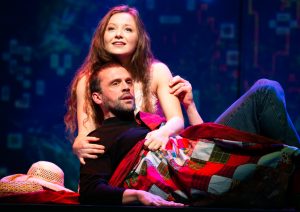
Steve (John Moore) and Chrisann (Madison Leonard) at Seattle Opera / Photo by Philip Newton
The outstanding new opera by Composer Mason Bates and Librettist Mark Campbell employs impressionistic vignettes and reflective flashbacks to tell the life story of a man who probably had greater impact on how we communicate today than anyone in modern history. Just look around you: If you aren’t already holding an Apple product in your hand, chances are someone near you is.
The original production was built in 2017 for Santa Fe Opera, San Francisco Opera, Seattle Opera, and the Jacobs School of Music at Indiana University. Initial reviews were mixed, but audiences loved it: especially its kaleidoscopic score, which fuses electronic sounds with skillful orchestration, amplified acoustic guitar with an array of gongs, Tibetan bells, and prayer bowls. (A live recording of the Santa Fe Opera production won the 2019 Grammy Award for Best Opera Recording.)
The idea was to use “sounds that actual Macintosh users heard,” the composer said of the opera’s opening, “to use elements of the technology that Steve Jobs created in the representation of his life.”
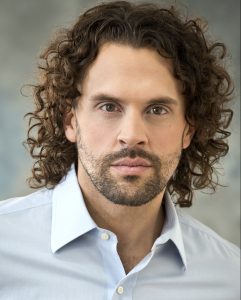
John Moore sings the title role in the Lyric’s new co-production
The San Francisco Chronicle did praise, at least, the “rhythmic urgency that infuses the entire work, a welcome contrast to the watery, mid-tempo speechifying that dominates so many contemporary operas.” But it was the warm public response that helped Mason and Mark understand the opera’s potential.
When Musical America named Mason its 2018 Composer of the Year, Washington Post music critic Anne Midgette wrote: “At a time when classical music is eagerly, anxiously, even desperately trying to connect with a younger generation, Bates is one of the rare composers who is at once popular, hip, and active at the large classical-music institutions… that are having the hardest time winning young audiences.”
Spurred by the overwhelming public response, Mark and Mason quickly set about creating a more compact version that could travel to medium-sized companies around the nation.
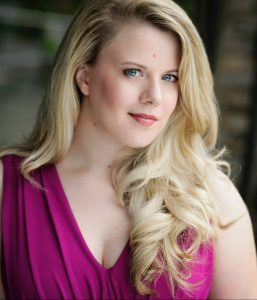
Sarah Larsen is Laurene Powell Jobs
This March 11th through the 13th, the Lyric Opera of Kansas City becomes one of three companies to present this new production, directed by Tomer Zvulun. The co-production with Austin Opera and Atlanta Opera “clarifies the opera’s arc and sharpens its message,” Mason said. “The beautifully streamlined set places us both in the world of the piece and, simultaneously, the dreamy space of Jobs’ mind.”
Tomer and his design team have “scaled back some elements and focused more on the story and the music,” Mark added, with a staging that “brings out the heart of the opera.”
While the new version still has plenty of eye-popping technology onstage, with set designs by Jacob Climer and projections by S. Katy Tucker, it takes a more intimate approach. “Our production is indeed highly technical, but we’re focusing on telling the story and looking at the relationships,” said Tomer, a Lyric favorite whose work was seen here most recently in a winning Eugene Onegin.
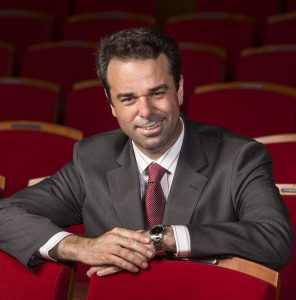
Stage Director Tomer Zvulun is also general and artistic director of Atlanta Opera.
This opera does not whitewash its subject. Steve Jobs was no saint. But nor was he the beast that has sometimes been portrayed in popular retellings of his life: as Walter Isaacson’s solid 2011 biography had made clear.
“We’re all flawed human beings,” Tomer said. “And as a director I’m much more interested in the relationships he had with his wife, or with his friend (Wozniak), or with his mentor or his ex-girlfriend, than I am in technology.”
Steve Jobs followed the meditative life of Zen Buddhism for much of his adult life, and its concept of the ensōcircle is central to the drama: it partly explains the “(r)evolution” of the title, a sort of Zen-inspired pun. (Steve’s spiritual mentor, the Zen priest Kōbun Chino Otogawa, is a central figure in the opera.)
The story’s gradual unfolding is therefore less about dramatic “arc” than about meditation, about a cyclical process rotating around itself in a non-chronological manner.
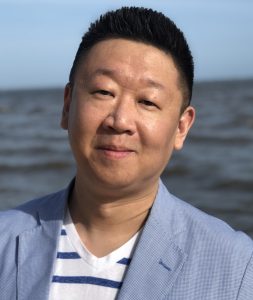
Wei Wu sings the role of Steve’s spiritual mentor, Kōbun Chino Otogawa.
“It’s like a memory play,” Tomer said, “a sleepless night in which we tell the story of Steve Jobs reflecting back on his life. … He’s the hub of this wheel, surrounded by all these characters that illuminate him, and each one of those vignettes is a fragment of his consciousness.”
We see 10-year-old Steve, building things on the workbench that his adoptive father made for him; Steve creating the first Apple products with colleague Steve Wozniak; Steve learning to meditate with his spiritual advisor, Kōbun; Steve with his pregnant girlfriend, Chrisann, whose daughter he initially refused to acknowledge as his; Steve finding a “center” in his wife, Laurene; and Steve the dying man, refusing traditional medicine to treat his pancreatic cancer.
What emerges is a complex picture of a person who at times pushed family and friends aside, and who may well have suffered from a “narcissistic personality disorder,” but whose relentless drive resulted in the iMac, the iPhone, the iPad, iTunes, and a myriad of other transformative innovations.

Tenor Bille Bruley performs as Steve Wozniak.
“He is documented as having said that his whole purpose was to give people wings so they could fly,” said John Moore, an Iowa-born Metropolitan Opera star who sang the title role in Seattle and reprises it here (and who made a strong impression here in 2019 in the Lyric’s Pearl Fishers). “He was not trying to be rich. He was not trying to personify total virtue. He was getting the hard work done so that we didn’t have to do it.”
Steve is defined here partly through his dichotomies. “He represents an intersection between technology and art,” Tomer said, “and the dichotomy of being a barefoot hippie and at the same time a sophisticated yuppie. He was into Zen Buddhism but he was also a power-wielding CEO. He was an artist but he was a businessman.”
Apple products are so pervasive that it’s useful to stop and remind ourselves of their significance in our lives. “Because things are moving so quickly that we’re forgetting the actual profundity of what Steve Jobs unleashed on us,” John said. “The greatest figures in history are not always the people who do things: They fade away eventually. It’s the people who set things in motion that are worthy of our recognition.”
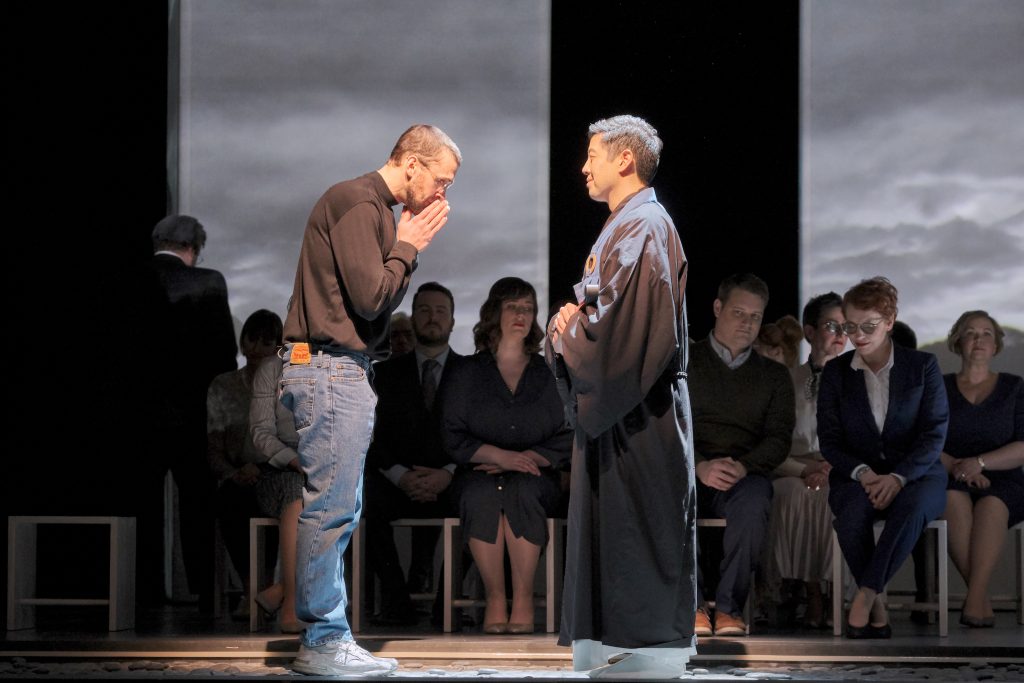
Steve and Kōbun at Seattle Opera / Photo by Jacob Lucas
For its creators, part of this opera’s draw is that its subject is of interest to millions. “This audience is going to be made up of opera outsiders,” John said. “I am interested… in those people who don’t know they love opera discovering it through a piece like this.”
Conducted by Michael Christie, the production also stars Bille Bruley, tenor (Steve Wozniak); Sarah Larsen, mezzo-soprano (Laurene); Madison Leonard, soprano (Chrisann); and Wei Wu, bass (Kōbun).
—By Paul Horsley
For tickets, call 816-471-7344 or go to kcopera.org. (While there, click on “Performances” and “The (R)evolution of Steve Jobs” for more information.)
To reach Paul Horsley, performing arts editor; send an email to paul@kcindependent.com or find him on Facebook (paul.horsley.501) or Twitter/Instagram (@phorsleycritic).